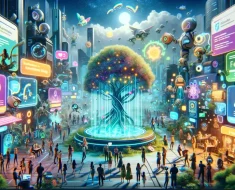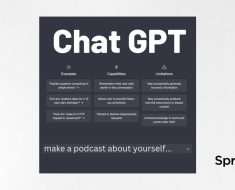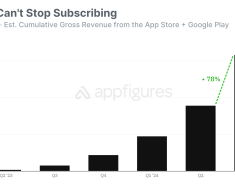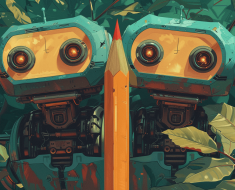I was there when Facebook became popular. I was also there for Twitter, YouTube, Spotify, and Instagram. I witnessed these platforms start from nothing and turning into the giants that they are today.
So trust me when I say this: none have fundamentally changed the way we view information as much as ChatGPT. It’s the single most disruptive technology I’ve seen in my life.
ChatGPT has taken the world by storm since its release in late 2022. This powerful AI chatbot is capable of generating text on a wide range of topics, and has captured the imagination of technologists and the general public alike. It represents a major leap forward for technology
But, can you trust it? Here’s everything you need to know before using ChatGPT.
What is ChatGPT?
Unless you’re living under a rock, you’ve likely heard of ChatGPT: a prompt-based AI chatbot that can generate texts from a user instruction. It’s a language model created by OpenAI, a San Francisco-based company, which is built using GPT architecture. It has a wide range of applications from simple writing to complex business automation.


For better or worse, ChatGPT has started to leave a crazy impact. With more than 180 million registered users, ChatGPT is currently one of the most popular platforms in the world.
According to SimilarWeb, it’s also the 22nd most visited website, trumping the likes of Quora, Twitch, Pinterest, and even Netflix.
What Can ChatGPT Do?
If you want to know how to use ChatGPT, it’s actually pretty simple. All you need to do is go to its official website, register for an account, and initiate a conversation. For example:


So, what else can ChatGPT do?
- Ideate and create blog posts.
- Analyze and create functional code.
- Generate marketing copy, sales scripts, and other business-related content
- Be your research partner and simplify complex topics into something anyone can understand.
- Now, with GPT-4V, ChatGPT can accept and analyze image prompts.
- And so much more!
Is ChatGPT a Legitimate Tool That’s Trustworthy To Use?
Absolutely.
OpenAI, the company behind it, are also made up of well-known and trusted figures in artificial intelligence. This includes people such as:
- Sam Altman: One of Time’s most influential people and former CEO of Y Combinator.
- Greg Brockman: Founding member of Stripe.
- Mira Murati: A respected figure in artificial intelligence ethics.
- Ilya Sutskever: A major TensorFlow contributor and Andrew Ng’s former post-doctorate co-author.
- Adam D’Angelo: CEO of Quora.
- Reid Hoffman: Co-founder of LinkedIn.
- Jessica Livingston: Co-founder of Y Combinator.
You’d find it find better minds in deep learning than this group.
ChatGPT is also trained on a massive amount of data, all of which are ethically sourced and curated. To be more specific:
- GPT-1: 7,000 books.
- GPT-2: 7,000 books and 8 million websites from an older version of CommonCrawl, which is essentially a filtered dataset of all publicly available webpages.
- GPT-3 and GPT-3.5: 499 billion tokens (words, punctuation marks, emojis) from CommonCrawl, WebText2, and Wikipedia.
- GPT-4: No official information, but it’s estimated to be trillions.
Of course there’s some skepticism on this data & what they’re doing with YOUR data, but we’ll talk about that in a little bit.
How Is ChatGPT Even Free?
Remember what I said earlier about OpenAI’s commitment to creating a globally-beneficial generative AI? That’s why ChatGPT is free.
ChatGPT isn’t created solely for profit, but to develop the first generation of artificial intelligence responsibly. As part of this goal, OpenAI collects user feedback to learn more about the system’s strengths and weaknesses. Every interaction with us is valuable data which helps in improving the technology and addressing its limitations.


Is ChatGPT Ethical?
One of the biggest ethical concerns surrounding ChatGPT is its potential for misuse. It can generate fake news or propaganda that is indistinguishable from real news. It could also be help create deepfakes, which are videos or audio recordings that have been manipulated to make it look or sound like someone is saying or doing something they never said or did.
- In 2023, The Guardian experienced a surge in fake news generated with ChatGPT using their name.
- ChatGPT Plus was also taken down for a day because of a bug that could expose credit card information.
- There’s also some debate on whether or not its plagiarism to directly copy answers from the chatbot.
Current ChatGPT Controversy
AI Hallucinations
To demonstrate what AI hallucination is, let me first show you this conversation I had with ChatGPT:


That’s good content! The only problem is, none of it’s real.
AI hallucination is a prominent problem in ChatGPT and other AI tools wherein they make up fake information to satisfy a prompt. This is often a result of prompts in informal registers, leading questions, vague prompts, and information beyond September 2021.
This is one of the reasons why I often don’t use ChatGPT for research. In my experience, Bard does a way better job at collecting and summarizing information.
In Education
Education was the single most affected industry when ChatGPT was released. In fact, almost 90% of students admit to using AI to cheat with their schoolwork. It got so bad that teachers had to completely reinvent their approach which led to the introduction of AI detection tools.
It was a good solution until another issue popped up: false positives and false negatives. These are human-written texts that are falsely flagged as ChatGPT-written and vice versa. OpenAI even made a statement saying that AI detection isn’t accurate — but that hasn’t stopped several teachers from using it. For example, Louise Stivers and William Quarterman of UC Davis both received academic sanctions for this issue.
Over-dependence
In February 2023, the administration behind Vanderbilt University was under fire for blatantly using ChatGPT as an attempt to reassure students after a mass shooting incident.
Last March, more than a thousand thought leaders around the world urged OpenAI to slow development down. They cited the “extremely large-scale risks” involved in creating a more advanced version of their language model. Some countries and companies have also started banning ChatGPT in their workplace. There have also been quantitative reports that say ChatGPT could be directly responsible for a global layoff.
Benefits of Using ChatGPT
With ChatGPT, you’re only limited by your imagination. Here are some things you can do with ChatGPT to benefit your workflow and life in general:
- Boosting Productivity. Need to draft an email? Automate it with ChatGPT. Researching a topic? Outsource it to ChatGPT. It’s invaluable in tackling tasks more efficiently, whether you’re a student, a business, or just someone looking to save time.
- Better Learning. As I previously mentioned, ChatGPT can simplify topics and provide examples. It’s like having a tutor right beside you all the time.
- Problem Solving: From tech support to DIY stuff, ChatGPT can lend a hand in troubleshooting and fixing.
Can You Make Money With ChatGPT
In my opinion, the easiest way to create money with ChatGPT is through content creation. With ChatGPT, you can either sell your writing or grow a blog. However, it’s not as easy as it looks. Since everyone has access to it, it’s not “special” anymore.
If you’re really good, you can also sell your services as a prompt engineer. But this niche is becoming more competitive by the second, so you can start with selling your prompts instead (yes, people buy prompts!) on platforms such as PromptBase.
There’s a demand for good programmers that can create systems that use the GPT API. If machine learning isn’t your niche, you can use ChatGPT anyway to write code for people and advertise your services in Fiverr, Reddit, and Upwork.
ChatGPT Alternatives
Claude
Claude is the newest addition to the already jampacked roster of AI language models today. Developed by Anthropic, this next-generation AI assistant focuses on ethical knowledge. As for the quality of its outputs, here’s a comparison between ChatGPT and Claude:




Claude is a lot more concise than ChatGPT and follows directions better. However, it tends to drift off to loosely related subjects more often. It also strikes the perfect balance between casual and formal.
On the other hand, ChatGPT is better at creating formal text. You can create better long-form content with ChatGPT — as long as your topic is publicly available information by September 2021. This tool is also more prone to using deeper words, which makes it more easily flagged by detectors.
Currently, Claude is available only in select countries. There’s also a limit on how many messages you can receive during its beta, but The Verge reports that the amount should roughly be ~100 messages per 8 hours. Otherwise, you can subscribe to their Pro version, which costs $20 per month, to get rid of the limit.
Bard
Bard is Google’s answer to ChatGPT. It’s based on a deep learning model that has been trained on a massive dataset of text and code. So, how does it perform?


I’d argue that Bard is better suited as a research tool than a writer. Not that it’s bad at creativity, but its outputs tend to look more like cliff notes than an actual essay. I sometimes find it tedious to use Bard because it tends to use bullet points. In fact, I don’t think I’ve ever seen a long-form answer from this tool without bullets and lists.
Nevertheless, it’s an awesome alternative for ChatGPT because it’s more robust in research. Bard has real-time data available for free, which already makes it much smarter than ChatGPT.
Still, if I’m looking for a writing assistant, I’ll always use ChatGPT over Bard.
The Bottom Line
I started this article with a question: is ChatGPT legit?
And my answer is a 100% yes, but you should still use it with caution.
ChatGPT is slowly becoming a staple of the internet. This unfortunately also means that it becomes a hotspot for bad actors, another innovation that they could abuse for their own means.
There’s also other important things to consider, such as what it means for society as a whole and why world leaders are pushing for OpenAI to slow its evolution.
However, if you’re an ethical person who’s fully aware of its capabilities and limitations, you can apply ChatGPT to any aspect of your life and it can make it better.
It truly is a once-in-a-lifetime invention, and I can’t wait to see how OpenAI develops this legitimately amazing language model into something that can benefit humanity as a whole.




